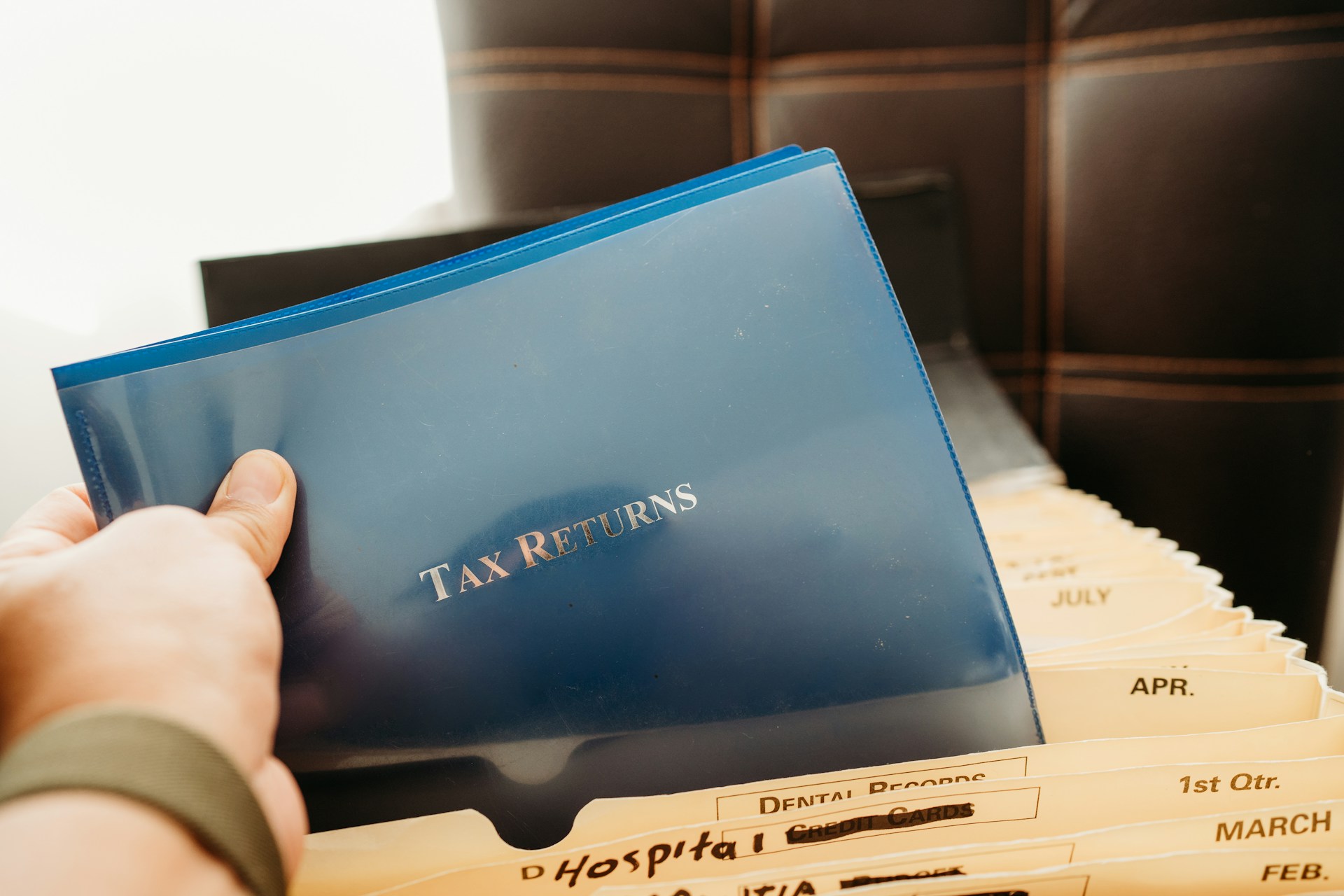Running a small business means wearing a lot of hats, especially when it comes to finances. Keeping the right tax records often falls to the bottom of the list until tax season hits. By then, hunting down receipts, invoices, or payroll reports turns into a crowded and stressful nightmare. The good news is, keeping tax records organized doesn’t need to feel like a second job. With a few practical habits, you can stay on top of things all year and sidestep the rush when deadlines hit.
Tax prep doesn’t begin in January. It starts with the decisions you make each week, like where you store your receipts or how often you record expenses. Staying ready all year long helps you avoid penalties, keeps you legally compliant, and gives you confidence in your books if you’re ever audited. And when October rolls around, like now, it’s a solid time to do a fall check-in and make sure everything is in shape before year-end approaches.
Why Keeping Accurate Records Matters
Accurate records are the foundation of smart business decisions. Whether you’re reconciling your books, preparing reports, or getting ready for tax season, your paperwork matters. In North Carolina, like most states, the law requires businesses to maintain financial documents that support income and deductions reported on returns. Failing to have these records in order can lead to fines, missed deductions, or even bigger tax bills than needed.
More than just staying legal, good records help reduce the stress that piles on during tax time. If every expense and payment is already tracked and categorized, filing is faster. That means fewer late nights sorting through your drawer of loose receipts or squinting at old emails trying to find an invoice. The clarity also helps when major decisions roll around, like applying for a loan or bringing on new staff, and you need to show your financial history quickly and clearly.
And then there are audits. They might not happen often, but if the IRS or state tax department does come knocking, having consistent and complete records can make a major difference in how it plays out. It’s the kind of preparation that helps protect your business, even if nothing ever goes wrong.
Types Of Tax Records To Keep
Small businesses deal with a wide range of transactions, and not all documents carry equal weight. Here’s a quick breakdown of the main record types you should organize and store:
– Income Records
Keep proof of every transaction that brings money in. This includes sales receipts, customer invoices, deposit slips, and statements from payment platforms. These documents show how much business you’ve done and when.
– Expense Records
These include vendor invoices, receipts for purchases, and proof of payment like bank statements or credit card records. They back up your deductions and help track where your money is going.
– Employee And Payroll Records
If you have workers or contractors, hang on to records like W-2s, pay stubs, timesheets, and tax withholding documents. You’ll also need payroll tax filings and payment histories.
– Asset Records
Whenever you buy or sell business assets such as equipment or vehicles, log the purchase price, date, property type, and any depreciation. If you sell that asset later, you’ll need this info to calculate gains or losses.
– Tax Returns And Related Documents
Always hold on to copies of filed returns, along with any letters or notices from the IRS or state department. Include extension requests, proof of payment, and anything sent during back-and-forth communication.
Having these documents neatly filed or digitized can save time down the line, answer questions quickly, and reduce the odds of errors during filing. It also gives you a clearer view of how your business is really performing throughout the year.
How Long To Keep Each Type Of Record
Knowing when it’s safe to clear out old records can be tricky. Hold onto them too long and you’re swimming in paperwork. Toss them too early and you could run into problems if there’s an audit or you need proof for a claim. Some documents only need a short shelf life, while others are worth keeping much longer.
Here are some general guidelines small businesses in North Carolina should follow:
– Income and Expense Records: Keep these for at least 3 years. That includes sales invoices, vendor receipts, and proof of payments. Some business owners prefer holding onto them for 6 years for added protection.
– Payroll Records: These should stick around for at least 4 years after taxes are filed. They include wage info, tax withholdings, and Social Security numbers.
– Asset Records: Equipment purchase and sale records or depreciation schedules should be stored for as long as you own the item, plus 3 years after it’s sold or disposed.
– Tax Returns and Supporting Info: Always keep full tax returns and related materials for at least 7 years. This includes correspondence, documentation for credits or deductions, and any adjustments made.
– Ownership and Legal Records: Anything tied to business structure like incorporation papers, meeting notes, or deeds should be retained permanently.
When in doubt, store it longer. It’s better to hang on to important forms than wish you had later. A file cabinet, labeled storage boxes, or organized cloud drive can make all the difference.
Tips For Efficient Record-Keeping
Staying organized with records doesn’t mean you need a complex system. In fact, the simpler it is, the easier it is to keep it going throughout the year. Try implementing a few habits that make daily tracking easier and tax time less stressful.
Here’s what works well for most small businesses:
1. Use digital tools
Scan paper receipts and store them digitally. Use accounting software that lets you attach documents to transactions so everything stays in one place.
2. Sort by category and year
Break your records down by type like income, payroll, expenses, and taxes. Keep them labeled by year, so you don’t waste time hunting.
3. Schedule mini check-ins
Don’t wait for April. Schedule a monthly or quarterly time to review receipts, upload missing records, and run reports.
4. Make backups
If you use digital storage, create backups. Store them on another device or in the cloud. Losing years of records to a hard drive failure hurts more than you think.
5. Team up with local experts
If managing these records feels overwhelming, working with an income tax service based right here in North Carolina can simplify the process. A professional knows what the state expects and can spot issues before they become problems.
Even ten minutes a week spent staying on top of your paperwork can save you hours of headache later. The key is to stay consistent and find a system that works for your workflow.
Getting Ready For Tax Season Before It Hits
Tax season always feels far away until it isn’t. If you’ve ever found yourself scrambling to find a missing invoice or remembering a cash payment months too late, you know the pressure. That’s why prepping early isn’t just smart, it keeps you sane.
Start by reviewing your current records before December. Look for missing items, miscategorized expenses, or anything that looks off. Catching errors early gives you time to fix them without rushing. If you’re dealing with staff, make sure payroll records are updated and year-end forms like W-2s and 1099s are being prepped.
Next, get familiar with what deductions you plan to take. This helps you double-check that you have the paperwork to support them. For example, if you’re claiming a vehicle for business use, make sure you’ve logged mileage and kept maintenance receipts.
Setting calendar reminders is a simple way to stay on track. Mark down filing deadlines, estimated payment due dates, and even task reminders to organize folders. Think of it like cleaning out the garage. It might be tedious at first, but it’s worth it when it’s done.
Keeping Your Business on Track All Year
Whether you’re filing quarterly or managing things annually, having the right records on hand makes everything smoother. It doesn’t just help your taxes. It helps with planning, budgeting, and protecting yourself when unexpected questions arise.
Staying consistent all year builds confidence in your business and helps you avoid that last-minute scramble. There’s no magic formula, but building good habits with record-keeping pays off in time and peace of mind. Staying organized gives you more control and fewer surprises. And if you ever need help, working with folks who know tax law in North Carolina can take a load off your shoulders while keeping your business in good shape.
Keeping your business on track with effective record-keeping ensures a smooth tax season and helps you stay agile with financial planning and decision-making. If you’re feeling swamped by tax responsibilities or unsure about compliance, consider exploring our income tax services in Elizabethtown, North Carolina. Speedy Tax Preparation & Bookkeeping Service is here to lighten your load and offer the support your business needs, ensuring your records are organized and ready when you need them most.







